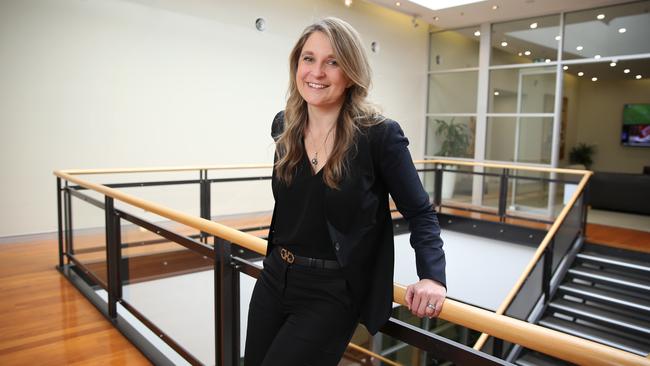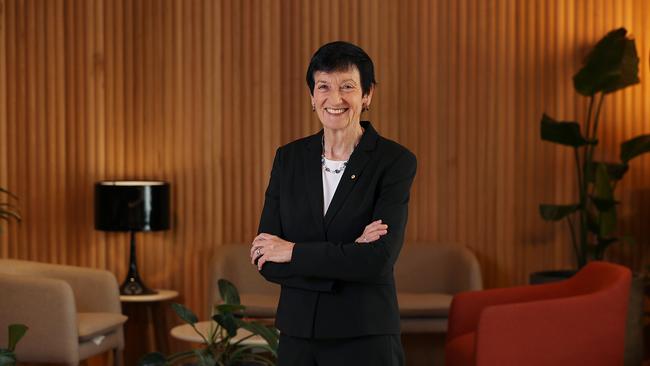Lessons not learnt in Optus hack disaster; Anna Bligh a BCA contender

Optus CEO Kelly Bayer Rosmarin set a new benchmark for corporate arrogance in her speech to The Australian Financial Review’s Business Summit on Wednesday, when she cast blame on almost everyone but herself for the outcome of the telco’s cyberattack in September.
Attendees were held captive to Bayer Rosmarin’s onstage pity party as she seemingly showered herself in glory over the company’s response to the devastating breach, and then dripped acid on journalists for daring to pursue answers on behalf of 10 million affected customers.
“There were reporters stalking me and I hadn’t been able to leave the house for 10 days,” Bayer Rosmarin said. We can only assume this comment was in reference to the discovery by The Australian that Bayer Rosmarin and her husband were hiding out at their Southern Highlands bolthole with a bodyguard as the crisis unfolded.
Whatever pressure Bayer Rosmarin was facing from the press, it didn’t stop her from hosting a handful of CEOs for a dinner party at her Vaucluse mansion just a few weeks after the attack. This was while customers were still waiting to find out if their passport details were being freely used by Albanian street-meat salesmen.
No sign of course-correction since, of course. It was journalists, she said, who were seeking “quick headlines” by predicting she would have to resign over the fiasco, and nothing to do with the line-up of government ministers who were freely sinking a size 13 boot into the telco over its catastrophic failures and self-inflicted trashing of its reputation.
Government Services Minister Bill Shorten slammed the lacklustre communication with affected customers (“Optus senior management are kidding themselves if they want a medal for the way they’ve been communicating,” he said), while Home Affairs Minister Clare O’Neil shocked Australians by saying the company had “left the window open” for data to be stolen.
Bayer Rosmarin is still clinging to a belief that the attack was launched by a “highly motivated and skilled cyber criminal”, and yet in the same breath she told the audience that Optus’s fresh line of defence against further breaches involved the introduction of a bug bounty and penetration testing of their systems.
This is laughable. Both are distressingly basic preventive measures that any responsible corporation would have deployed years and years ago; their absence only speaks to the company’s total lack of preparedness, and only bolsters O’Neil’s assertion of an open window at the firm.
Still, Bayer Rosmarin shamelessly hailed the fact that “not a single customer” suffered financial loss or fell “victim to crime”, holding up these figures as though they were a product of sound management and not the outcome of sheer, unadulterated luck.
One redeeming note to her speech: Bayer Rosmarin said she didn’t have the hubris to suggest further attacks would not occur. We presume it’s because she’d already drawn on the gallon-loads of hubris she already possessed.
Bligh a BCA contender
It’s been nearly a month to the day since Jennifer Westacott, CEO of the Business Council of Australia, announced she would step down from her role and serve out an extensive notice period to find her replacement.

No need for that, apparently, with efforts to locate a successor already reaching a galloping pace.
Margin Call understands the recruiting firm working with the BCA board, understood to be Russell Reynolds Associates, has refined its shortlist to two final candidates as of this week.
One is said to be the CEO of an industry association; the other is apparently a former politician.
That’s an impressive turnaround on Westacott’s announcement, and it comes despite her flagging of a leisurely notice period spanning 18-months.
Actually we hear the board had already been working on finding a successor for some time – months, apparently – before the news of her exit leaked. Doubtless, the handover with whoever takes the job is likely to proceed more speedily than expected.
Plenty of room for guessing who the two candidates might be; we think the former politician is probably Anna Bligh, CEO of the Australian Banking Association. The former Labor premier just happened to grace this column on Thursday over her apparent fumble of banking interests that were caught up in Labor’s Compensation Scheme of Last Resort.
It was Bligh’s job to get the banks off the hook from funding the scheme but that didn’t transpire, despite her storied influence with the Albanese government.
Five-finger discounts
A strong showing over at John King-led Myer on Thursday after it posted higher than usual net profits. And yet we were intrigued to learn that those margins could have been even higher if not for the old five-finger discount biting hard into the department store’s bottom line.

It seems opportunistic punters have been pinching kit off the shelves at their highest rate in five years, driving down the group’s operating margin and hacking away something like $8m from its P&L statement.
Myer CFO Nigel Chadwick delivered the numbers with the topspin that $12m in shrinkage actually presents an opportunity for the group. That’s certainly one way to sell it. Expect more cameras and sensors, along with a bolstering of loss-prevention teams.
In doing so Myer hopes to arrest the slide in its gross margins over the past three years; they’ve fallen to 36.25 from 38.37 per cent in H122, and from 39.16 per cent recorded in H120.
“We believe this can be significantly addressed over time, presenting an opportunity for us,” Chadwick said on Thursday. “We continue to believe there is upside potential.”
Not that Myers’ investors would have given a tablespoon of s..t given the record sales, bumper bottom line and the announcement of a special dividend that combined to fire up the company’s share price. At the close they were 18 per cent higher at $1.13.
Not a bad day for King and his team, with their options now well in the money.
Lew’s payday
Meanwhile, it’s been a long time coming, but retail billionaire Solomon Lew is in front to the tune of about $90m on his estimated $152.5m investment in Myer.
Margin Call’s back of the envelope calculations reveal that Lew, via his listed Premier Investments, has spent an average of about 72c a share accumulating his stock in the recovering department store group over the past five or so years.
He now has a 25.8 per stake and has been granted a seat on the JoAnne Stephenson-chaired Myer board with Premier’s representative, Terry McCartney.
Myer shares coming in at $1.13 would value Lew’s 211.8m holding at an impressive $239.3m; the company’s market value is now close to once again topping $1bn.
Premier doesn’t mark its stake in Myer to market, so the company therefore doesn’t take the change in the value of the Myer shares – whether they increase or decrease – to Premier’s bottom line. Instead Premier recognises the shares as a non-current asset on Premier’s balance sheet, based on the shares’ value at balance date.
Dividends, however, go straight to Premier’s bottom line. The 8c a share declared by King is a payment of $16.94m to Premier, which will be a sweet fill-up to net earnings that should help the declaration of Premier’s own dividend come July.



To join the conversation, please log in. Don't have an account? Register
Join the conversation, you are commenting as Logout